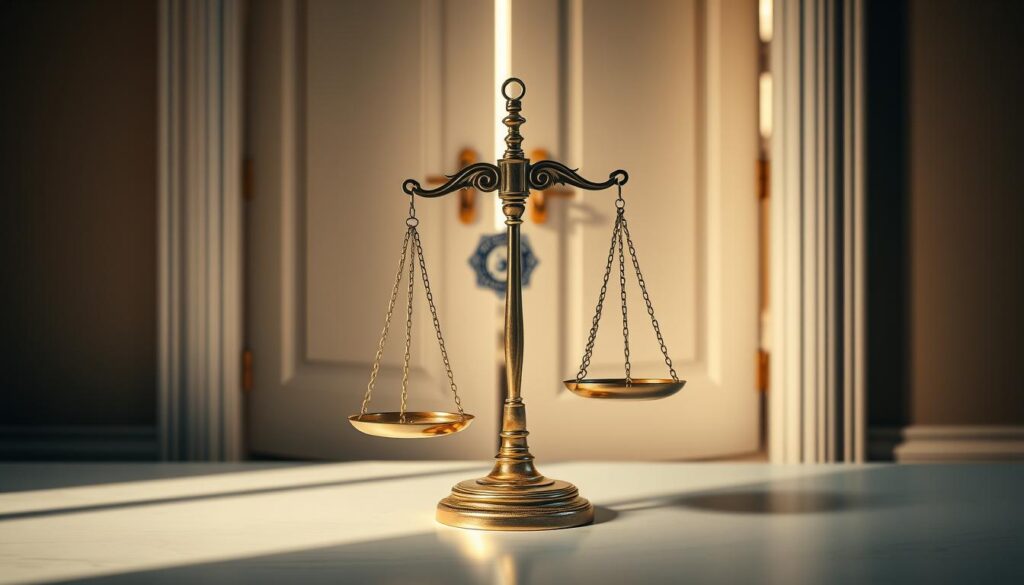The Fourth Amendment protects citizens from unreasonable searches and seizures. It’s a key safeguard against government overreach.
When law enforcement acts without proper authority, it can have serious consequences. This can harm individual rights and the justice system.
Police need a valid search warrant based on probable cause. Without it, evidence may be excluded from criminal trials.
This is called the exclusionary rule. It stops illegally gathered evidence from being used.
Some exceptions to the warrant requirement exist. These include plain view, emergencies, and consent searches.
However, these exceptions are limited. They must be used carefully to protect constitutional rights.
What Does It Mean to Seize Without Legal Authority?
Seizing without legal authority means law enforcement acts without proper justification. This includes seizures without valid warrants or probable cause.
The Fourth Amendment requires warrants based on probable cause. Warrantless seizures are usually unconstitutional unless they fall under specific exceptions.
Law enforcement needs reasonable suspicion or probable cause for seizures. Home searches without warrants are typically unreasonable, according to Payton v. New York.
Officers can conduct traffic stops with reasonable suspicion of violations. School officials don’t need warrants to search students under their authority.
Some exceptions allow seizures without individualized suspicion. These include highway sobriety checkpoints and border searches.
Generally, seizures without legal authority violate Fourth Amendment protections. They’re considered unreasonable search and seizure under the Constitution.
Legal Implications of Unauthorized Seizure
Illegal seizures by law enforcement can have serious legal consequences. The exclusionary rule blocks evidence from unlawful seizures in criminal trials.
This rule, called “fruit of the poisonous tree,” makes all related evidence inadmissible. However, the exclusionary rule has limits and doesn’t apply to all courts.
Qualified immunity may protect officers from personal liability. The plain view doctrine and other exceptions can justify warrantless seizures.
The legal effects of unauthorized seizures can be complex. Understanding these rules is key to protecting rights and ensuring justice.
How to Protect Yourself from Unauthorized Seizures
Knowing your rights is key to stopping unauthorized seizures. You can refuse consent searches.
Learn about warrant rules and when they’re not needed. Officers can search without a warrant in urgent cases.
Searches after arrest are limited to you and nearby areas. The plain view rule allows some warrantless searches.
Cars can be searched without a warrant in certain cases. If your rights are violated, record it.
Talk to a lawyer to protect your rights. They can help you understand the law.
Understanding your rights helps prevent unauthorized seizures. This knowledge protects your constitutional freedoms.
Remedies for Seizing Without Legal Authority
When police take property illegally, people have options to protect their rights. One way is filing suppression motions to block evidence in court.
This helps stop unlawful police actions. It protects people from unfair searches and seizures.
Civil rights lawsuits can also be filed against police agencies. These seek money for damages and hold officers responsible.

People may file complaints with the police department too. This can lead to officer discipline, but it’s not common.
Using legal strategies helps protect rights and stop illegal seizures. A lawyer can guide you through these complex processes.
Conclusion: The Importance of Legal Authority in Seizures
Legal authority balances law enforcement needs and individual rights. It ensures due process and prevents power abuse.
Proper legal authority in seizures builds public trust. It upholds the justice system and law enforcement’s credibility.
Understanding legal authority promotes accountability and respects rights. Ongoing training for law enforcement is key.
The Supreme Court stresses reasonableness in warrant exceptions. Privacy expectation tests have shaped this standard.
Legal seizures protect due process and constitutional protections. They also foster law enforcement accountability.
FAQ
What is the Fourth Amendment and how does it relate to seizing without legal authority?
The Fourth Amendment guards against unreasonable searches and seizures. It protects people from government officials taking things without proper legal grounds.
What constitutes an unauthorized seizure?
Unauthorized seizures happen without a valid search warrant or probable cause. They can also occur when searches go beyond what’s allowed.
What are the legal consequences of seizing without proper authority?
Courts may exclude evidence from illegal seizures under the exclusionary rule. Some officers might have protection under qualified immunity.
How can individuals protect themselves from unauthorized seizures?
You can refuse to allow searches. Know about warrant rules and exceptions to warrantless searches.
If you think your rights were violated, write down what happened. Talk to a lawyer for advice.
What remedies are available for victims of unauthorized seizures?
Victims can ask courts to throw out illegally gotten evidence. They can also sue for civil rights violations.
Filing complaints with the police agency is another option.
Why is legal authority in seizures important?
Legal authority balances law enforcement needs with personal rights. It promotes accountability and ensures fair treatment under the law.







